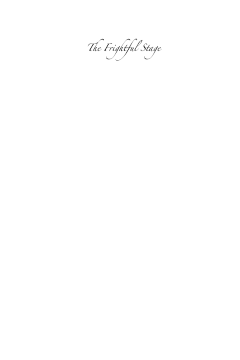
Additional Information
Book Details
Abstract
In nineteenth-century Europe the ruling elites viewed the theater as a form of communication which had enormous importance. The theater provided the most significant form of mass entertainment and was the only arena aside from the church in which regular mass gatherings were possible. Therefore, drama censorship occupied a great deal of the ruling class’s time and energy, with a particularly focus on proposed scripts that potentially threatened the existing political, legal, and social order. This volume provides the first comprehensive examination of nineteenth-century political theater censorship at a time, in the aftermath of the French Revolution, when the European population was becoming increasingly politically active.
“Goldstein's collection is essential reading for anybody wanting to investigate the struggle [over censorship] within a wider European framework.” · Journal of Modern Italian Studies
“This well-written book succeeds in delivering what it sets out to do and is a welcome addition to published resources.” · European Review of History—Revue européenne d’histoire
“…a highly informative and readable volume…an important book which gathers new research about the theatre that did exist in 19th-century Europe, and the theatre that did not.” · The Journal of Theatre Research International
“Each chapter is equipped with a substantial and informative biographical essay,providing readers with a reading list of their next visit to the library.” · Canadian Journal of History/Annales canadiennes d/histoire
"The book is distinguished by its thematic and stylistic unity…Splendid as a compact synthesis of a large amount of specialized research, it will also be of great value in teaching at universities and comparable institutions." · Nyt fra Historien
"That this volume offers a mass of often very colorful details allows for intriguing new questions about individual countries' practices…the chapters themselves provide excellent introductions to each case study. The detailed bibliographical essays that follow each essay may well stimulate more comparative research in the future." · H-German
"All essays are well researched and clearly written, with invaluable extensive bibliographies. They also illustrate the complexities of interaction between politics and culture and paradoxes in the use of the theater." · Choice
"Robert Justin Goldstein and his co-authors have written a masterful study tracing the social history of nineteenth-century European theatre censorship. By describing the class nature of theatre censorship and connecting the regulation of the stage to the larger issues of work discipline and the struggle for political power, the authors have produced an important study that will speak to interdisciplinary audiences interested in the relationship between the popular culture, the state, and society." · Michael Nash, Director of the Tamiment Library, New York University
"That theatrical censors were particularly active in continental Europe during the nineteenth century is well known. The virtue of Robert Goldstein's collection is to focus attention on ways in which the situation changed from country to country, from one political situation to another, from one social class to another. Since each chapter is assigned to a different expert, we are assured of having the best possible coverage of these differences from scholars who know intimately the history in each country. Their bibliographical essays, furthermore, provide invaluable points of departure for further research. Anyone who loves nineteenth-century theater or opera in any European context will find this book an invaluable resource." · Philip Gossett, Professor Music and Romance Languages and Literature, The University of Chicago, author of Divas and Scholars: Performing Italian Opera (2006).
"Theater censorship in the 19th-century is a key issue for understanding relationships between urban society, government and new cultural trends. This book offers a large view of the different situations in Europe, showing both the specificities of each country and the converging trends, thus revealing the secret unity of theater as a forum in Europe at large. A very useful and finely composed book." · Christophe Charle, Professor and Director of the Institute of Modern and Contemporary History at the Sorbonne in Paris. He is the author of almost 20 books, including, most recently, Theatres en capitales: Naissance de la société du spectacle à Paris, Berlin, Londres et Vienne (2008).
"This is an exceptionally rich collection of essays on a key intersection between culture and politics in 19th-century Europe. The volume highlights the importance of wide-ranging censorship in European politics of the time, but also the social context in which theater could assume an importance that will surprise and inform a contemporary readership. Stimulating comparative insights cap a significant contribution to modern history." · Peter N. Stearns, Provost, George Mason University, Editor, Journal of Social History
“An excellent introduction to theater censorship for an English-speaking audience as well as for individuals who have the linguistic skills to carry out further, more specialized research. It brings out the similarities between theater censorship across Europe during the nineteenth century, but at the same time provides fascinating details of how different political events in each country influenced the types and severity of theater censorship.” · Janice Best, Chair of the Department of Languages and Literature at Acadia University, Canada and author of La subversion silencieuse: censure, autocensure et lutte pour la liberte d’expression (2001)
“This is a very useful collection … fills a real gap in the literature. . . The texts are … very good and the bibliographical essays make the volume a valuable resource.” · Robin Lenman, formerly University of Warwick, author of Artists and Society in Germany, 1850-1914 (1997)
Robert Justin Goldstein is Emeritus Professor of political science at Oakland University, Rochester, Michigan, and Research Associate at the Center for Russian & Eastern European Studies at the University of Michigan at Ann Arbor. He has written and edited numerous books on modern American and European history, including Political Repression in Nineteenth-Century Europe (1983), Political Censorship of the Arts & the Press in Nineteenth-Century Europe (1989) and (ed.) The War for the Public Mind: Political Censorship in Nineteenth-Century Europe (2000).
